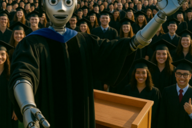You have /5 articles left.
Sign up for a free account or log in.
Professor Samuel Abrams’s research on the leftward lean of student-facing campus administrators should not surprise anyone who pays attention to higher education. The key finding: over 70% of student-facing campus administrators are liberal, compared to only 6% who are conservative. That’s a 12-1 ratio.
Is this a problem?
I can think of two reasons this leftward lean is positive, and two scenarios that should give us pause.
The positives:
- We ought to hope that our campuses are places with a wider range of identity diversity and a greater devotion to open debate than most other spaces in our society. Welcoming identity diversity and fostering open debate are values typically associated with liberals. So, having liberals as college administrators to create such environments makes sense to me.
- College is an intense time in people’s lives. People in the majority culture have had the ability to build spaces (fraternities and sororities come to mind) where they can be comfortable during this life stage. Because minorities often do not have that advantage, it makes sense to me that colleges would be especially proactive in hiring people who have a heart for, and skills in, helping first generation students and other minorities get their sea legs in a challenging environment.
Scenarios that should give us pause:
- If the progressivism of campus administrators is more characterized by being opposed to some identities, rather than taking care to be open to all. I think the situations at Evergreen State and Reed are probably the best examples of campus actions that, whatever their initial motivations might have been, principally expressed themselves in being opposed to certain identities. In the case of Evergreen State, forcefully asking white people to stay away from campus for a day. In the case of Reed, continuous protests of a core course in ways that made professors feel threatened and that ultimately frustrated students. When campus administrators play a role in these kinds of movements, it goes against the basic ‘free discourse open to all within very broad limits’ ethos of the academy, and that’s a problem.
- If there are significant segments of students who feel like their campus administrators do not understand them, and do not want to. Religious conservatives come especially to mind, by which I mean students who have traditionalist understandings of any religion. More conservative Muslims, Evangelicals, Jews, Catholics, Latter Day Saints, etc. are typically uncomfortable with everything from the use of profanity to public expressions of sexuality. I don’t think the college environment needs to build itself around these needs, but I’ve seen way too many campus administrators who are openly disdainful of these identities (a posture that runs counter to students’ own expectations of college based on national research). I’ve heard a shocking number of college administrators say to me in public settings that they don’t like religion because of the way it oppresses people. At that point, I’m the one who has to surreptitiously do repair work in the room, taking pains to highlight how enriched I’ve been through friendships with people of different faiths, how it’s important to welcome diverse identities and learn from them, etc. When I get done I think to myself, “Isn’t it your job to make people of diverse identities in the room feel comfortable?”
I think that there is a lot at stake here. The two cautionary scenarios I highlight suggest some of what’s at stake – the values of the university, the inclusion of religious conservatives.
But I think we in higher education are fooling ourselves if we do not take seriously the threat of a loss in public trust. Right now, it is slowly eroding in some quarters, and it’s the kind of thing that can go very very quickly. If significant segments of the public (white working class, Republicans, people who live in rural areas, religious conservatives) decide that they don’t trust higher education anymore, that jeopardizes everything from funding for state university to tuition for small private colleges to something more abstract but arguable more significant – the pride and identity that this nation has historically found in its relationship with higher education.

